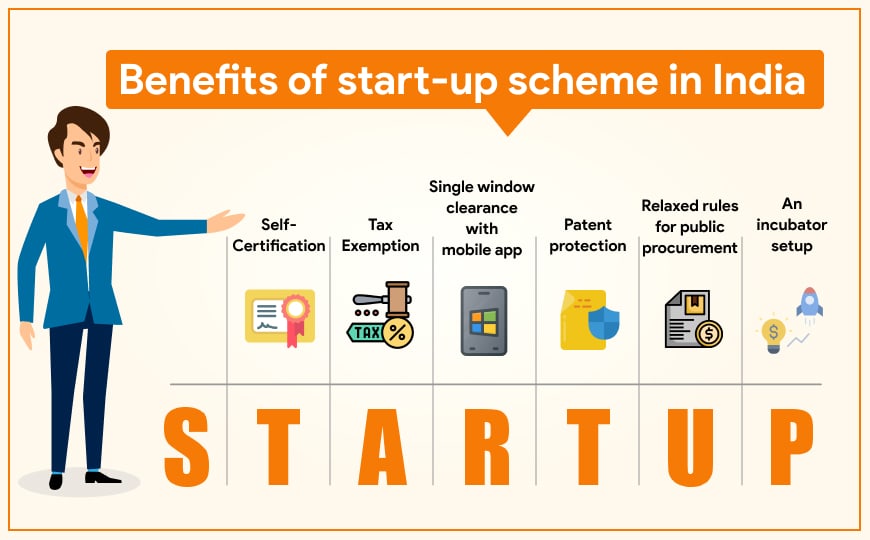Startups are the heart of innovation and economic growth, but navigating the complex landscape of taxes can be daunting for new businesses. However, understanding the tax benefits available can significantly impact a startup’s financial health and longevity. In this blog post, we’ll explore the various tax advantages that startups can leverage to thrive and grow.
Benefit for Startups Under Income Tax
Tax Deductions:
Startups can deduct many of their business expenses, including salaries, rent, utilities, marketing costs, and equipment purchases, from their taxable income. These deductions reduce the amount of income subject to taxation, thereby lowering the overall tax burden.
Research and Development Tax Credits:
Many governments offer tax credits or incentives to encourage research and development (R&D) activities. Startups engaged in innovative projects or technological advancements may qualify for these credits, providing a valuable source of funding to fuel further growth and innovation.
Qualified Small Business Stock (QSBS):
Qualified Small Business Stock refers to shares of certain small businesses that meet specific criteria outlined in tax laws. Investors who hold QSBS for a specified period may be eligible for significant tax benefits, including the exclusion of a portion of their capital gains from taxation upon the sale of the stock.
Net Operating Loss Carryforward:
Startups often experience losses in their early years as they invest in growth and development. However, these losses can be carried forward to offset future taxable income, reducing or eliminating taxes in profitable years. This provision provides startups with valuable flexibility and breathing room as they navigate the challenges of entrepreneurship.
Tax Holidays and Incentives:
Some jurisdictions offer tax holidays or incentives specifically targeted at startups and small businesses. These incentives may include reduced tax rates, exemptions from certain taxes, or grants for job creation and investment. Taking advantage of these programs can significantly enhance a startup’s financial position and competitiveness.
Employee Stock Option Plans (ESOPs):
Employee stock option plans are a popular tool for startups to attract and retain top talent. Under certain conditions, stock options granted to employees may qualify for favorable tax treatment, allowing employees to defer taxation until they exercise their options or sell the underlying stock.
Set off and carry forward of losses:
Section 79(b) of the Income Tax Act 1961 allows eligible startups to carry forward their losses due to lower income, revenue, or profits and set them off in the year when the income, revenue, or profits would be sufficient to cover the losses from previous years. Consequently, there will be fewer tax deductions in profitable years because the income gained would be significantly reduced by offsetting substantial losses from previous years, leaving minimal income subject to taxation. It’s important to note that such losses can be carried forward for a maximum of 7 years from the date of incorporation of an eligible startup.
Additionally, there should be a continuity of 51% shareholding or 100% continuity of original shareholders with voting rights in the startup from the incorporation or registration years until the profitable year when the losses are set off. This continuity condition applies, provided that changes in shareholding result from death or gift to any relative, or if an Indian company becomes a subsidiary of a foreign company due to amalgamation or demerger, subject to specific conditions.
3 years tax holiday for startups:
This tax holiday is applicable only to eligible startups as specified under section 80-IAC of the Income Tax Act, 1961. This section became effective on April 1, 2017. According to this provision, startups can choose any 3 consecutive assessment years out of the 7 years from the date of incorporation or registration. For these 3 consecutive years, they will be granted tax exemption or tax rebate, meaning they won’t have to pay tax for this chosen 3-year period on the income or profits they earn. This 3-year period is commonly referred to as a ‘Tax Holiday’.
The conditions stipulate that the eligible startup must be incorporated on or after April 1, 2016, but before April 1, 2021, and the total turnover of its business must not exceed INR 25 crores. Furthermore, the Finance Bill, 2020 proposed an amendment to these provisions. Clause (36) of the Finance Bill 2020 seeks to substitute the ‘7 years’ period with ’10 years’ and raise the turnover limit from 25 crores to 100 crores. Therefore, the deduction will be available for 3 years out of 10 starting from the year of incorporation, and the maximum permissible turnover will be increased to 100 crores. This amendment will take effect from April 1, 2021, and will be applicable from the assessment year 2021 – 2022 and subsequent assessment years.
FAQ: Benefit for Startups Under Income Tax
1. What tax benefits are available for startups?
Startups can access various tax benefits under income tax regulations, including deductions for business expenses, research and development (R&D) tax credits, net operating loss (NOL) carryforwards, benefits for qualified small business stock (QSBS), tax holidays, and incentives.
2. How do tax deductions benefit startups?
Tax deductions allow startups to reduce their taxable income by deducting eligible business expenses such as salaries, rent, utilities, marketing costs, and equipment purchases. This lowers the overall tax liability, freeing up capital for investment and growth.
3. Can startups receive tax credits for research and development (R&D) activities?
Yes, many governments offer tax credits or incentives to encourage R&D activities among startups. These credits provide financial support for innovative projects and technological advancements, helping startups invest in research without bearing the full tax burden.
4. What are net operating loss (NOL) carryforwards, and how do they benefit startups?
NOL carryforwards allow startups to offset losses incurred in previous years against future taxable income. This reduces or eliminates taxes in profitable years, providing valuable financial flexibility to startups as they navigate early-stage growth and investment.
5. How do qualified small business stock (QSBS) provisions benefit startups and investors?
QSBS provisions offer tax benefits to investors who hold shares in qualifying small businesses. These benefits may include the exclusion of a portion of capital gains from taxation upon the sale of QSBS, incentivizing investment in startups and facilitating access to capital.
6. Are there tax holidays and incentives specifically for startups?
Yes, some jurisdictions provide tax holidays or incentives tailored to startups, offering reduced tax rates, exemptions, or grants for job creation and investment. These incentives help startups conserve cash flow and remain competitive in their respective markets.
7. Can startups offer employee stock option plans (ESOPs) to attract talent?
Yes, ESOPs are a popular tool for startups to attract and retain top talent. Under certain conditions, stock options granted to employees may qualify for favorable tax treatment, enhancing the startup’s ability to recruit skilled professionals and incentivize performance.
8. How can startups maximize the benefits available under income tax regulations?
To maximize tax benefits, startups should work closely with tax advisors and professionals to ensure compliance and leverage available deductions, credits, and incentives. Understanding the nuances of income tax regulations can help startups optimize their tax strategy and position themselves for long-term success.
Conclusion: Navigating the complexities of income tax regulations can be challenging for startups, but understanding the available benefits can provide a competitive edge and fuel sustainable growth. By leveraging tax deductions, R&D credits, QSBS provisions, NOL carryforwards, tax incentives, and ESOPs, startups can optimize their tax strategy and maximize their financial resources for innovation and expansion. As always, consulting with a qualified tax advisor or accountant is essential to ensure compliance and maximize the benefits available to your startup.




